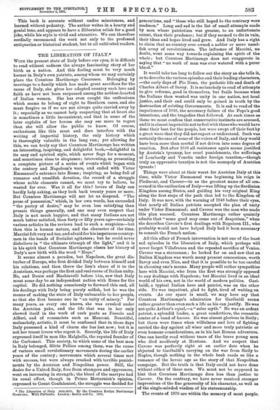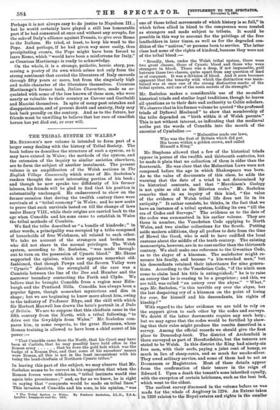THE LIBERATION OF ITALY.*
WITH the present state of Italy before our eyes, it is difficult to read without sadness the always fascinating story of her birth as a nation. And this feeling must be very much keener in Italy's own patriots, among whom we may certainly place the Countess Martinengo Cesaresco. Belonging by marriage to a family which has made great sacrifices for the cause of Italy, she gives her adopted country such love and faith as have not been surpassed among the noblest-hearted of Italian women. She has even caught the enthusiasm which seems to belong of right to Southern races, and she must forgive us if we are not always quite carried away by it ; especially as we cannot help suspecting that at heart she is sometimes a little inconsistent, and that in some of the later exploits of her heroes she may see more to regret than she will allow the public to know. Of course, enthusiasm like this must and does interfere with the writing of impartial history, the only history which is thoroughly valuable in the long run; yet allowing for this, we can truly say that Countess Martinengo has written an interesting, inspiring, and delightful book,—delightful in its easy and spirited style, which never flags for a moment, and sometimes rises to eloquence; interesting, as presenting a complete picture of a series of events which began with the century and Napoleon's wars, and ended with Victor Emmanuel's entrance into Rome ; inspiring, as being full of romance and unselfish devotion, the record of a struggle whose noble elements cannot, we must try to believe, be wasted for ever. Was it all for this ? lovers of Italy can hardly help asking, as they look back twenty years or more. But Countess Martinengo will not let us despond. " The prose of possession," which, in her own words, has succeeded " the poetry of desire," may be even less satisfying than prosaic things generally, and one may even suspect that Italy is not ranch happier, and that many Italians are not much better satisfied, than forty or fifty years ago—certainly various articles in the reviews lead to such a suspicion—but then this is human nature, and the character of the time. Mazzini felt very sad too, and afraid for his impetuous country- men in the hands of Socialist agitators ; but he could never disbelieve in " the ultimate triumph of the light," and it is in his spirit that Countess Martinengo closes her history of Italy's new birth with the word " Hope."
It seems almost a paradox, but Napoleon, the great die- turber of Europe, who first divided Italy between himself and his relations, and then threw the lion's share of it to the Austrians, was perhaps the first and real cause of Italian unity. He, and Dante and Machiavelli before him, saw that Italy must some day be an independent nation with Rome for the capital. He did nothing consciously to forward this end, all his dealings with Italy being purely selfish, but he was the means of making the state of Italy unbearable to her people, so that she first became one in " an unity of misery." For many years, as every one knows, she was crashed under the Austrian yoke, and the life that was in her only showed itself in the work of such poets as Foscolo and Alfieri, and of romancists such as Manzoni. Beautiful, melancholy, artistic, it must be confessed that in those days Italy possessed a kind of charm she has lost now; but it is not her truest lovers who regret it. Secretly, the life of Italy expressed itself in men like Malghella, the reputed founder of the Carbonari. This society, to which some of the best men in Italy belonged, Silvio Pellico among them, was the cause of various small revolutionary movements during the earlier years of the century ; movements which several times met with success, but were always crushed with terrible punish- ments by the Austrian and Neapolitan power. Still, the desire for a United Italy, free from strangers and oppressors, went on increasing in strength; the blood of the martyrs had its usual effect, though in Prince Metternich's opinion, expressed to Count Confalonieri, the struggle was decided for
• The Liberation of Italy 1815-1870. By the Countess Evelyn Martinengo Cesaresco. With Portraits. London: Seeley and Co. 1895. generations, and " those who still hoped to the contrary were madmen." Long and sad is the list of small attempts made by men whose patriotism was greater, to an unfortunate extent, than their prudence; but if they seemed to die in vain, their ideas and hopes lived and grew. And Italy has a right to claim that no country ever owned a nobler or more unsel- fish army of revolutionists. The influence of Mazzini, no doubt, went some way towards explaining the spirit of the whole ; but Countess Martinengo does not exaggerate in saying that "no work of man was ever watered with a purer blood."
It would take too long to follow out the story as she tells it, or to describe the various episodes and their leading characters, —the early days of Pio Nono, the pathetic life and death of Charles Albert of Savoy. It is melancholy to read of attempts to give reforms, good in themselves, but futile because what the Italians then wanted was unity in one nation, not local justice, and their end could only be gained in truth by the destruction of existing Governments. It is sad to read of the impatiences of 1848, the necessary failure of the Pope's good intentions, and the tragedies that followed. At such times as those we must confess that conservative instincts are aroused, and it is almost impossible not to feel with thosewho would have done their best for the people, but were swept off their feet by a great wave that they did not expect or understand. Such was certainly the case of some of the rulers of Italy, and they would have been more than mortal if not driven into some degree of reaction. But after 1848 all resistance again seems justified by Austria's tyranny, her cruel punishments, the sufferings of Lombardy and Venetia under foreign taxation,—though truly an oppressive taxation is not the monopoly of Austrian tyrants !
Things were about at their worst for Austrian Italy at this time, while Victor Emmanuel was beginning his reign in Piedmont, and Cavour—to us the greatest name of all con.
cerned in the unification of Italy—was lifting up the Sardinian Kingdom among States, and guiding his very original King along the first steps of the path that led to the Kingdom of Italy. It was now, with the warning of 1848 before their eyes, that nearly all Italian patriots accepted the plan of unity under Victor Emmanuel ; and Cavour was the man who made this plan succeed. Countess Martinengo rather quaintly admits that " some good may come out of despotism," when she describes Cavour's first dealings with Napoleon III., who probably would not have helped Italy had it been necessary to consult the French nation.
All this affair of French intervention is not one of the least sad episodes in the liberation of Italy, which perhaps will never forget Villafranca and the repeated sacrifice of Venice.
Cavour was a statesman ; he looked far on and saw that an Italian Kingdom was worth many present concessions, worth Savoy and even Nice, and that it is possible to be too careful in choosing one's means. Many people will rather sympathise here with Mazzini, who from the • first was strongly opposed to any dealings with Napoleon; but Mazzini lived in an ideal world of his own, not in the world of modern politics. Gari- baldi, a typical Italian hero and patriot, was on the other side. He was impatient, glad to fight, tired of waiting on events. • As our space is small, we may here say that Countess Martinengo's admiration for Garibaldi seems
rather greater than even such a life as his can justify. He was not quite Arthur's equal,—a " solar myth." He was an ardent Patriot, a splendid leader, a great condottiere, the romantic centre of a band of heroes. He was almost glorious in Sicily; but there were times when wilfulness and love of fighting carried the day against all wiser and more truly patriotic or even humane considerations, as in his last Roman adventure. One can hardly read without tears of the brave young men who died needlessly at Mentana. And we suspect that Cavour was perfectly right at an earlier date when he objected to Garibaldi's carrying on the war from Sicily to Naples, though nothing in the whole book reads so like a romance of the heroic age as the story of that Neapolitan campaign. But the truth is that Italy could not have done without either of these men. We must not be supposed to hint that Countess Martinengo does less than justice to Cavour. On the contrary, we have never received stronger impressions of the fine generosity of his character, as well as of the single-minded wisdom of his statesmanship.
The events of 1870 are within the memory of most people.
Perhaps it is not always easy to do justice to Napoleon III.; but he would certainly have played a still less honourable part if he had consented at once and without any scruple, for the sake of Italy's alliance against Prussia, to give over Rome to the Italians. He tried, at least, to keep his word to the Pope. And perhaps, if he had given way more easily, thus precipitating events, the Pope might have been forced to leave Rome, which "would have been a misfortune for Italy," as Countess Martinengo is ready to acknowledge.
On the whole, it is a strange, pathetic, heroic story, pos- sessing a poetry of its own which arises not only from the strong sentiment that carried the liberators of Italy onwards through fifty years or more, but from the singularly high and noble character of the liberators themselves. Countess Martinengo's former book, Italian Characters, made us ac- quainted with some of the less known of these men, who were nearly as valuable to their country as Cavour and Garibaldi and Mazzini themselves. In spite of many past mistakes and disappointments, and of present doubt and anxiety, Italy may look back proudly on the century. And as to the future, her friends must be unwilling to believe that her race of unselfish heroes has yet died out, or over will.



















































 Previous page
Previous page